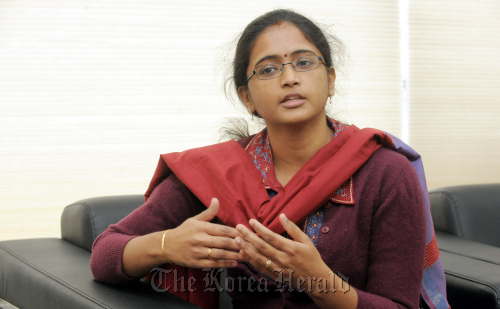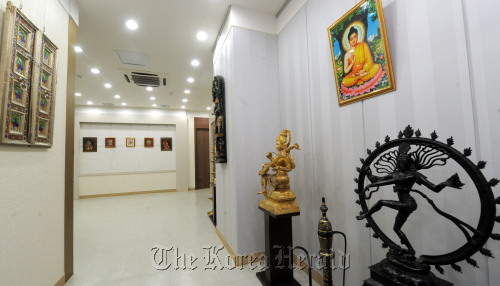Indian Cultural Center chief says day during Yeosu Expo will be designated India Day
This is the seventh article of the series introducing cultural centers of different countries in Seoul. ― Ed.
Some aspects of Indian culture like the cuisine or yoga have already permeated into the South Korean society. Banu Prakash, director of Indian Cultural Center, however, asserted that there is much more to the Indian culture which is very heterogeneous.
“People from Korea or India who moved to the U.S., for example, cannot continue living the life of a Korean or Indian. They have to mingle, speak English, eat burgers, and melt down to fit in to the society. But in India, they can still be themselves and still be one big union. Each province has its own language, traditions, culture and even its own education policies,” said Prakash.
This is the seventh article of the series introducing cultural centers of different countries in Seoul. ― Ed.
Some aspects of Indian culture like the cuisine or yoga have already permeated into the South Korean society. Banu Prakash, director of Indian Cultural Center, however, asserted that there is much more to the Indian culture which is very heterogeneous.
“People from Korea or India who moved to the U.S., for example, cannot continue living the life of a Korean or Indian. They have to mingle, speak English, eat burgers, and melt down to fit in to the society. But in India, they can still be themselves and still be one big union. Each province has its own language, traditions, culture and even its own education policies,” said Prakash.

“Travelers always want to go again (to India), to see the whole country,” she added.
The Indian Cultural Center, the Cultural Wing of the Indian Embassy here, opened in April 2011 in Hannam-dong, central Seoul. Despite its short history, the center has hosted a number of successful events already.
The Festival of India held from June 30 last year to March 10, for example, introduced the Indian traditional music and dance as well as contemporary culture like films to nine cities throughout Korea including Seoul; Busan Metropolitan City; Geochang, South Gyeongsang Province; Jeonju, North Jeolla Province and Jeju Island.
Another successful event was the Indian Film Festival which was held in February in Busan and earlier in March in Seoul. It showcased six Indian films including “Taare Zameen Par,” “Wake up Sid” and “Jodha Akbar” played to a full house, reflecting the growing interest in Bollywood movies. The center plans to hold the festival every year.

Indian films are very unique in style, said Prakash, explaining that India has more than 100 years of history in movie making and that the country is the world’s No. 1 movie producer with the largest budget.
She added that Bollywood films have some similarities with Korean movies in some ways. “In Indian movies one can see song sequences, in which people sing a song and dance. But they are very similar to Korean movies because they take your sadness and real stories and they try to make movies out of it. The movies that do well in India, like those in Korea, are those closer to life,” she said
The center also offers various educational programs such as Indian traditional and contemporary dance classes, yoga classes, Hindi language classes and Korean classes for non-Korean speakers.
One of the center’s major plans for this year is to celebrate the first anniversary of Tagore’s statue which was installed in the Maronnier Park in Hyehwa-dong, central Seoul, last year. Last year was the 150th anniversary of the birth of Tagore, a Nobel Prize winning poet and artist, who is one of the most influential figures from India.
It is also looking forward to the India Day which will fall during the Yeosu Expo period from May 12 to Aug. 12. Koreans as well as visiting foreigners will be able to enjoy a variety of Indian culture at the Yeosu Expo venues in South Jeolla Province that day.
Many plans are set for the year 2013 as well, which will be the 40th year of Korea-India diplomatic relationships.
“We will be working closely with the Korean Embassy in New Delhi, and are planning to bring a relics exhibition to Korea as early as the end of 2012. We are also planning to sign an agreement with the Korean government for a comprehensive cultural exchange,” said Prakash.
For more information on Indian Cultural Center, visit indoculture.org.
By Park Min-young (claire@heraldcorp.com)
-
Articles by Korea Herald


![[Exclusive] Korean military set to ban iPhones over 'security' concerns](http://res.heraldm.com/phpwas/restmb_idxmake.php?idx=644&simg=/content/image/2024/04/23/20240423050599_0.jpg&u=20240423183955)



![[Herald Interview] 'Amid aging population, Korea to invite more young professionals from overseas'](http://res.heraldm.com/phpwas/restmb_idxmake.php?idx=644&simg=/content/image/2024/04/24/20240424050844_0.jpg&u=20240424200058)


![[Pressure points] Leggings in public: Fashion statement or social faux pas?](http://res.heraldm.com/phpwas/restmb_idxmake.php?idx=644&simg=/content/image/2024/04/23/20240423050669_0.jpg&u=)









